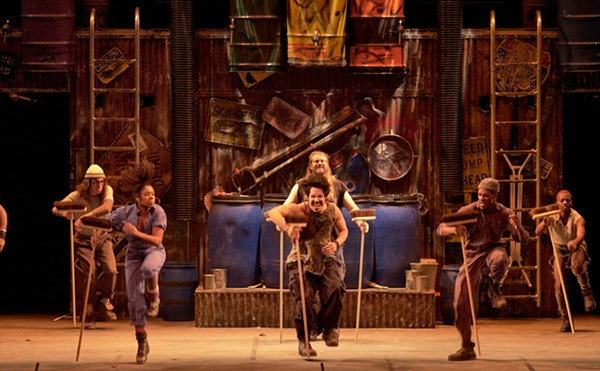"I wouldn't mind your being peculiar. But do you have to work at it so hard?" When Henry David Thoreau's mother says that to him, early in The Night Thoreau Spent in Jail, we aren't yet aware that it will serve as an excellent summary of this script by Jerome Lawrence and Robert E. Lee.
Thoreau famously wrote Walden, that enduring paean to the natural life, independence and self reliance. This play is set in pre-Walden times, when Thoreau is sent to the local slammer for a night due to his refusal to pay taxes. He made this Trumpian anti-tax gesture to register his opposition to the Mexican-American war (shh, don't tell the president-elect we've already waged war on Mexicans, he might get ideas).
The well-performed and slickly directed work frequently feels like a collection of extended Thoreau quotes has been staged, rather than a play with a coherent dramatic arc. As a result, we are left with many monologs delivered with verve and passion by Geoff Knox as Thoreau. Some of these are witty, as when he says, "Anytime you hear a man called 'loony,' just remember that's a great compliment to the man and a great disrespect to the loon. A loon doesn't wage war and his government is perfect, being nonexistent."
The play slides in and out of various scenes as quickly as Knox steps off the small jail cell platform, which he shares with a vagrant named Bailey (an amusing Allen Branstein). In those non-incarcerated moments, Henry David banters with his muse Ralph Waldo Emerson, his brother John (a sometimes overly intense Joe Pine) and several others. These include the nasty Deacon Ball (Scott C. Hare) who advocates for corporal punishment of young students, and an African-American man named Williams (crisply rendered by Davion Brown) who finds kindness and a refuge on Thoreau's little plot of land, which was loaned to Mr. T by Emerson.
There are certainly some interesting philosophical tidbits served up in this script. When Bailey muses on the curiosity of time zones ("... how could it be one time here and another time somewhere else? Isn't it now all over?"), Thoreau responds with, "You're wiser than most men who wear watches. I don't know what good it does to hang numbers on the hours. You can't count a river when it moves by you." Then again, it's hard to figure out what time you need to get to the airport by gazing at a river.
If the playwrights' names ring a bell, it's because they wrote a much better work titled Inherit the Wind, the play about the Scopes "monkey" trial and the debate between creationism and evolution. In that play, fictionalized versions of Clarence Darrow and William Jennings Bryan go at each other hammer and tong in the courtroom, speaking not just to the Scopes case at hand but also to the larger issue of the time, the rancid Joseph McCarthy trials in the 1950s.
The devoted transcendentalist Thoreau is as interesting a character as Darrow and Bryan, but Henry David's issues don't resonate as powerfully. For instance, he was convinced that if a man relies on his instincts, he can't go wrong. That might have made more sense in a simpler world but carries inherent problems when the globe is bristling with nuclear armaments and volatile confrontations on a daily basis. For that reason, Thoreau feels rather more dated than Inherit the Wind. It also lacks the dramatic tension provided by two immense intellects arguing vociferously with each other.
In Thoreau, the authors struggle to find that kind of tension and relevance. When Thoreau goes on his anti-tax rant declaring, "I will not pay one copper penny to an unjust government!" it's hard not to roll your eyes. Most of us have been disappointed by governments that we considered "unjust" in one way or another, yet we "little people" still pay taxes because we know there's a common good that must be funded.
Idealists such as Thoreau didn't have to consider those nasty little niceties, as Emerson tells him in the second act: "You pull the woods up over your head. You resign from the human race. Are your fish going to build roads, teach schools, put out fires?" As Emerson, Terry Burgler strikes a balance between idealism and rationality, and the play would be stronger if the script had allowed these two men to engage with each other even more. Still, director Celeste Cosentino paces the show as well as possible, even though the first act still feels excessively long and a bit scattered.
Thoreau had plenty of ideas, some of them very appealing in light of the election — living alone, in the silent woods, in seclusion. However, for good or ill, we are stuck with each other in this crowded, cacophonous world.












